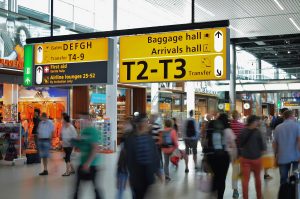
What does Canadian law say in the event of a delay attributable to the airline?
Every year, millions of passengers pass through Canadian skies, confident in the promise of a punctual arrival at their destination. But what happens when that promise is blown away with the wind and you find yourself grounded, the victim of a delay attributable to the airline? The answer lies in the intricacies of Canadian legislation, a legal edifice as robust as an Airbus A380.
Navigating the regulation skies can be as complex as flying an airplane in the middle of a storm. Yet, it is crucial for every traveler to know their rights; the latter are often more extensive than we think… As long as you know where to look.
Legal context
Canada’s regulatory framework for air travel has been significantly strengthened with the coming into force of the Air Passenger Protection Regulations (APPR). These regulations, instigated by Transport Canada and applied since July 15, 2019, are a cornerstone in the landscape of passenger rights. It offers a clear set of standards that airlines must meet or face sanctions.
The APPR set out specific requirements for communicating with passengers, among other things; It requires carriers to provide regular and accurate information when a delay occurs. In addition, it defines what constitutes a delay “attributable to” the company – that is, a delay caused by factors within the direct control of the carrier such as maintenance or operations management.
The obligations of companies go beyond mere information; They also include assistance and compensation for passengers affected by these delays. The terms and conditions vary according to the length of the delay and the impact suffered by the traveller, but they constitute a significant guarantee for the latter.
Situation | Passenger rights | Indemnification / Services | Conditions / Important Notes |
Delay attributable to the company (> 2 hours) | Mandatory information on the cause and rights (Art. 13 RPPA) | Regular communication, details on solutions offered | Applicable to delays caused by factors under the control of the company (maintenance, operations). |
Delay > 2 hours (chargeable) | Assistance and support (Art. 14 and 15 RPPA) | Complimentary meals and beverages | Free from 2 hours late. |
Delay resulting in overnight stay | Accommodation and hotel-airport transport supported | Hotel or similar accommodation + shuttle bus | Mandatory if late exceeds the scheduled evening of the trip. |
Delay on arrival between 3 and 6 hours | Financial compensation (Art. 19 RPPA) | Large companies: $400 ; small: reduced amount | Delay attributable to the company, except for safety reasons or external circumstances. |
Late arrival between 6 and 9 a.m. | Financial compensation | Large companies: $700 ; small: reduced amount | Same conditions. |
Late arrival > 9 a.m. | Financial compensation | Large companies: $1,000 ; small: reduced amount | Same conditions. |
Claim procedure | Claim first to the company | Response within 30 days | Form or direct contact; Attach tickets, proofs and communications. |
Recourse | Complaint to the CTA | Possible binding decision | The CTA intervenes after failure with the company. |
Exceptions | No monetary compensation | Basic services only | Delays due to extreme weather, medical emergency, ATC instructions, out-of-control situations. |
Passenger rights
When you are faced with a delay attributable to your airline, several rights activate like so many lifelines on the turbulent waters of passenger inconvenience. First: information. The company is required to clearly explain the nature of the delay and your rights in relation to the delay (section 13 of the APPR).
Second: hospitality. If the delay extends beyond a certain limit (usually two hours), the company must offer meals and refreshments… And if the delay persists to the point of requiring overnight accommodation, it must provide accommodation as well as transport to it (Articles 14 and 15).
Thirdly: financial compensation. Depending on the length of the delay and its impact on your original itinerary, you may be entitled to monetary compensation of up to $1,000 CAD (Article 19). This measure aims not only to repair the damage suffered but also to encourage airlines to optimize their operations to minimize these incidents.
Procedure in case of delay
What to do when you are caught in the net of a delay? The first reflex is to require your carrier to comply with its obligations as set out above… But what if that is not enough? In this case, you have recourse to the Canadian Transportation Agency (CTA), the ultimate guardian of your rights as a passenger.
To initiate a complaint with the CTA, it is first necessary to have tried to resolve the dispute directly with the airline. If this has not been successful after a reasonable period of time (usually ninety days), you can submit your complaint formally via the form available on the CTA’s website.
The NEB will then review your file to determine if your rights have been violated and what form of corrective action would be appropriate. This procedure may result either in a negotiated resolution between the parties or, if necessary, in a binding decision vis-à-vis the offending carrier.
Limitations and exceptions
It is important to note, however, that some delays are beyond the control of airlines themselves: those caused by extreme weather conditions or medical emergencies, for example. In these cases, referred to as “exceptions”, the obligations in terms of compensation may be mitigated or non-existent.
In addition, while generous in its approach to consumer protection, the APPR have certain limitations on the types of aeroplanes involved (it must be a motorized aircraft with at least 30 seats) and the situations covered. Charter flights or those operated as part of a tour package may follow different rules.
In addition, understanding these nuances is essential because they directly influence your potential remedies. Getting to grips with these subtleties can seem tedious; Nevertheless, this is often what distinguishes a prepared traveler from one caught off guard by the vagaries of the air.
Tips
To conclude our celestial legislative exploration: some practical advice. Always keep your travel documents (e-tickets, confirmations, etc.) as well as any proof of the delay (informative emails, photos of the notice board, etc.). These elements will be your best allies if you have to prove your case before a regulatory or judicial body.
Be proactive! Do not hesitate to ask immediately about your options as soon as a delay is announced; “He who says nothing consents” is not a maxim applicable here… And finally: keep patience and courtesy when interacting with flight crew or on the ground – they are often as frustrated as you are by this unforeseen situation.
The Canadian skies are therefore full of promises as well as imponderables; But armed with the right knowledge of your rights in the event of an airline delay, you’re ready to confidently face any regulatory turbulence that could disrupt your celestial journey.


